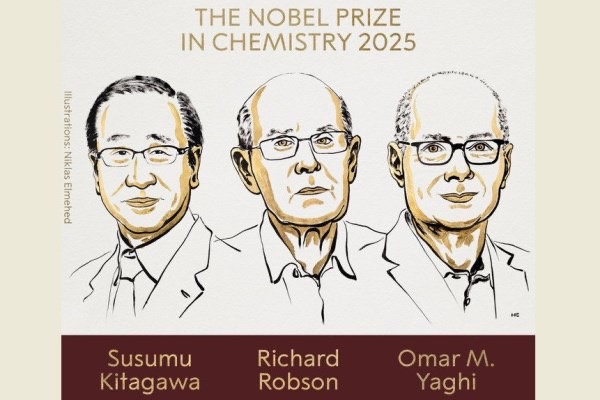Metal–Organic Frameworks Usher in a New Era of Materials Science: Japanese, British, and American Scholars Win the Nobel Prize in Chemistry

The Royal Swedish Academy of Sciences announced on October 8 (local time) that the 2025 Nobel Prize in Chemistry has been awarded jointly to Professor Susumu Kitagawa of Kyoto University in Japan, British chemist Richard Robson, and Professor Omar M. Yaghi of the University of California, Berkeley, for their pioneering contributions to the study of metal–organic frameworks (MOFs).
According to the Nobel Committee, the three scientists successfully designed porous materials composed of both metal ions and organic molecules. These materials possess vast internal spaces and adjustable structural properties, allowing gas or liquid molecules to move freely in and out. This technology can be applied in areas such as water harvesting from air, carbon dioxide capture, toxic gas storage, energy conversion, and chemical catalysis, opening a new chapter in materials science and sustainable environmental applications.
Robson began his research on coordination polymers in the 1970s and, during the 1990s, designed metal–organic structures with regular cavities, laying the theoretical and experimental groundwork for MOFs. Yaghi advanced the field with his concept of “reticular chemistry,” developing a new branch of chemistry that connects molecules through strong bonds into open frameworks. He also created covalent organic frameworks (COFs), further driving the practical applications of MOFs. Kitagawa discovered that such structures exhibit gas adsorption and storage capabilities, transforming theoretical concepts into real-world applications and making MOFs a central focus of next-generation green materials research.
Experts describe MOFs as a real-world version of a “magic suitcase,” capable of “holding” large numbers of molecules within their microscopic structures. The technology is now widely used in environmental management, clean energy development, and the design of novel catalytic materials, with thousands of projects around the world based on MOF research.
Heiner Linke, Chair of the Nobel Committee for Chemistry, stated: “This research has not only created an entirely new molecular space but has also opened limitless possibilities for designing functional materials.” The three laureates will share a prize of 11 million Swedish kronor (approximately NT$35.6 million).
- 105 reads
Human Rights
Fostering a More Humane World: The 28th Eurasian Economic Summi

Conscience, Hope, and Action: Keys to Global Peace and Sustainability

Ringing FOWPAL’s Peace Bell for the World:Nobel Peace Prize Laureates’ Visions and Actions

Protecting the World’s Cultural Diversity for a Sustainable Future

Puppet Show I International Friendship Day 2020

